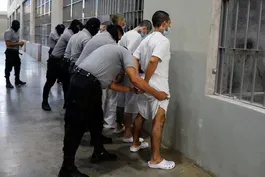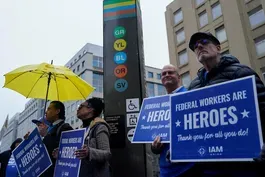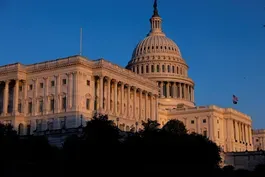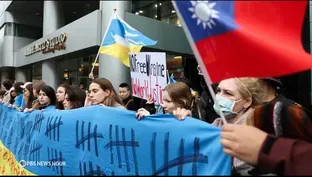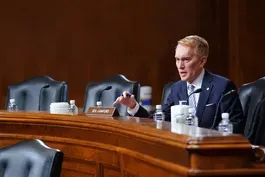
Analyst breaks down China’s response to Trump’s trade war
Clip: 4/8/2025 | 6m 28sVideo has Closed Captions
Analyst breaks down China’s response to Trump’s trade war
For perspective on the growing trade war between the United States and China and the ripple effects it’s having, Amna Nawaz spoke with Elizabeth Economy. She served as the senior advisor for China in the Commerce Department during the Biden administration and is currently a senior fellow at the Hoover Institution.
Problems with Closed Captions? Closed Captioning Feedback
Problems with Closed Captions? Closed Captioning Feedback
Major corporate funding for the PBS News Hour is provided by BDO, BNSF, Consumer Cellular, American Cruise Lines, and Raymond James. Funding for the PBS NewsHour Weekend is provided by...

Analyst breaks down China’s response to Trump’s trade war
Clip: 4/8/2025 | 6m 28sVideo has Closed Captions
For perspective on the growing trade war between the United States and China and the ripple effects it’s having, Amna Nawaz spoke with Elizabeth Economy. She served as the senior advisor for China in the Commerce Department during the Biden administration and is currently a senior fellow at the Hoover Institution.
Problems with Closed Captions? Closed Captioning Feedback
How to Watch PBS News Hour
PBS News Hour is available to stream on pbs.org and the free PBS App, available on iPhone, Apple TV, Android TV, Android smartphones, Amazon Fire TV, Amazon Fire Tablet, Roku, Samsung Smart TV, and Vizio.
Providing Support for PBS.org
Learn Moreabout PBS online sponsorshipAMNA NAWAZ: For perspective on the growing trade war between the United States and China and the ripple effects it's having, we turn now to Elizabeth Economy.
She served as the senior adviser for China in the Commerce Department during the Biden administration.
She's currently a senior fellow at the Hoover Institution.
Elizabeth, welcome back to the "News Hour."
And we should note that things do change quickly on this front.
As we sit here and speak now, just past 6:00 Eastern on the East Coast, the administration is insisting it's moving forward with this ramping up of tariffs on China.
Based on what you have seen so far, how do you expect China to respond?
ELIZABETH ECONOMY, Former Senior Adviser for China, U.S. Commerce Department: I mean, I think we have seen that China has produced a fairly robust retaliatory toolkit.
I assume that they are going to hit back with reciprocal tariffs.
They will undoubtedly put more export controls on additional critical minerals that we need for our technology and defense industries.
I think we can expect that they will target additional individual U.S. companies for investigations of some sort and perhaps place more U.S. companies on the unreliable entity list, which means that they're not able to trade with China.
We also saw with the most recent round of tariffs that China moved to devalue its currency to help its exports to be cheaper and also intervened in the Chinese stock market to bolster some of the share prices.
So it's taking a very active and assertive role to try to keep the Chinese economy on course.
AMNA NAWAZ: Do you have a sense of what kind of impact the U.S. tariffs have already had on China, what kind of impact these new tariffs could have, what industries would be worst hit?
ELIZABETH ECONOMY: I mean, I think there's no doubt the Chinese economy has been struggling ever since COVID.
It has -- it failed to rebound post-COVID.
And so it's been struggling.
I think the sectors that are going to be hardest hit are those that export the most to the United States and are operating with the thinnest profit margins.
So I would expect sort of electronic consumer goods and apparel, furniture, toys, all of these industries, I think, are potentially going to be devastated at some level by this additional tariff hike, which, frankly, we're getting almost to farcical levels of tariffs at this point.
AMNA NAWAZ: That post-COVID slow economic recovery, does that in any way apply additional pressure to President Xi?
And I know the government there has been taking a lot of steps to try to spur more consumer spending and boost the economy.
But does that pressure in any way add up to more leverage for the U.S.?
Does it bring Xi to the negotiating table faster?
ELIZABETH ECONOMY: I think what we have seen from Xi Jinping and from the array of Chinese leaders who've spoken out on this is that they are prepared to go toe to toe with Donald Trump on these tariffs.
There's going to be no bowing down to President Trump.
And I think what we maybe need to understand a little bit better than we do is that these tariffs are actually proving to be a political boon to Xi Jinping.
If you look back a couple of months ago on Chinese social media, you would have seen a lot of criticism of the Chinese economy and most of it, even blatantly, directed towards Xi Jinping.
So he really was bearing the brunt of the criticism for the slowing of the Chinese economy, for the fact that there was a virtual nonexistent at this point FDI going into the country, no private venture capital.
So you really had a Chinese economy that was struggling.
Today, when you look at Chinese social media, what you see is a range of emotions, everything from confusion to defiance and anger, and all of it targeted at the United States, none of it now targeted at Xi Jinping.
We have essentially created for Xi Jinping a scapegoat for all of the economic ills that his policies created.
And now he's able to rally the Chinese people around a new threat, namely, the United States, Donald Trump, and these tariffs.
AMNA NAWAZ: So if this now becomes a question of which of these two nations, representing the two largest economies in the world, which can withstand more pain for longer, who in your view is better positioned to withstand the Chinese economy?
ELIZABETH ECONOMY: I mean, both have their own advantages.
I think what's increasingly in my mind, quite frankly, is whether or not the Trump administration wants China to come to the table, because I think at this point, again, these tariffs are almost at farcical levels and it sort of begs the question, what is it that we're trying to accomplish?
And I think, within the administration, there are a range of views.
I think there are some that actually see this as beneficial and sends a signal to other countries that if you retaliate the way that China did, you look at the consequences.
I think there are others who would actually like to see the two economies decouple.
I think if you look back at statements that Peter Navarro made during the first Trump administration and even before he was in government service, I think he's someone that actually would see China not coming to the negotiating table as a positive.
And then, finally, I think there's a possibility that this is part of a broader strategy, not one that's been actually articulated by the Trump administration, but perhaps are pieces of a puzzle that are coming together that really is designed to contain China.
I think if you think about the administration effort to reverse-engineer the Kissinger move and try to pry China away -- pry Russia away from China, or if you think about the difference between how we deal with our European as opposed to our Asian allies, where we're looking to bolster our security relationships in Asia and threatening to withdraw from NATO, I think there is a question that emerges in my mind at least about whether or not all of this comes together in a package of the U.S. effort to basically contain China.
AMNA NAWAZ: All right, Elizabeth Economy of the Hoover Institution joining us tonight, thank you so much for your time.
Really appreciate it.
ELIZABETH ECONOMY: Thank you.
Conditions in the prison where deported migrants are held
Video has Closed Captions
The conditions inside the infamous El Salvador prison where deported migrants are held (5m 1s)
Global economies teeter with tariffs set to go into effect
Video has Closed Captions
Global economies hang in the balance with Trump's tariffs set to officially go into effect (4m 17s)
Man whose blood helped develop measles vaccine on skepticism
Video has Closed Captions
Man whose blood helped develop measles vaccine weighs in on recent outbreak (5m 51s)
News Wrap: Supreme Court blocks federal worker reinstatement
Video has Closed Captions
News Wrap: Supreme Court blocks reinstatement of federal workers fired by Trump (5m 56s)
Some House Republicans reject GOP Senate budget plan
Video has Closed Captions
Amid tariff turmoil, House Republicans face critical moment for Trump’s agenda (4m 6s)
Supreme Court clears way for Alien Enemies Act deportations
Video has Closed Captions
Supreme Court clears way for deportations under Alien Enemies Act (5m 10s)
Taiwan watches Ukraine war, fearing similar move from China
Video has Closed Captions
Taiwan closely watches Ukraine war, fearing China could attempt a similar takeover (8m 4s)
Trade battle 'headed to good spot long-term,' Lankford says
Video has Closed Captions
U.S. trade battle 'headed to a good spot long-term,' GOP Sen. Lankford says (6m 34s)
Providing Support for PBS.org
Learn Moreabout PBS online sponsorshipSupport for PBS provided by:
Major corporate funding for the PBS News Hour is provided by BDO, BNSF, Consumer Cellular, American Cruise Lines, and Raymond James. Funding for the PBS NewsHour Weekend is provided by...
